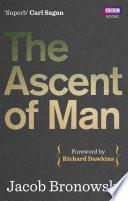Quotes from work
The Ascent of Man

The Ascent of Man is a 13-part British documentary television series produced by the BBC and Time-Life Films first broadcast in 1973; it was written and presented by British mathematician and historian of science Jacob Bronowski. Intended as a series of "personal view" documentaries in the manner of Kenneth Clark's 1969 series Civilisation, the series received acclaim for Bronowski's highly informed but eloquently simple analysis, his long, elegant monologues and its extensive location shoots.

Sourced to the book, The Ascent of Man (1973), BBC Books: London, Chapter 13: The Long Childhood, p. 330.
The Ascent of Man (1973)
Context: We are all afraid - for our confidence, for the future, for the world. That is the nature of the human imagination. Yet every man, every civilization, has gone forward because of its engagement with what it has set itself to do. The personal commitment of a man to his skill, the intellectual commitment and the emotional commitment working together as one, has made the Ascent of Man.

Episode 11: "Knowledge or Certainty"
Source: The Ascent of Man (1973)
Context: The symbol of the University is the iron statue outside the Rathskeller of a barefoot goose girl that every student kisses at graduation. The University is a Mecca to which students come with something less than perfect faith. It is important that students bring a certain ragamuffin, barefoot irreverence to their studies; they are not here to worship what is known but to question it.

“The world can only be grasped by action, not by contemplation.”
Unidentified episode
The Ascent of Man (1973)

Episode 13: "The Long Childhood"
The Ascent of Man (1973)
Context: And I am infinitely saddened to find myself suddenly surrounded in the west by a sense of terrible loss of nerve, a retreat from knowledge into—into what? Into Zen Buddhism; into falsely profound questions about, Are we not really just animals at bottom; into extra-sensory perception and mystery. They do not lie along the line of what we are able to know if we devote ourselves to it: an understanding of man himself. We are nature’s unique experiment to make the rational intelligence prove itself sounder than the reflex. Knowledge is our destiny. Self-knowledge, at last bringing together the experience of the arts and the explanations of science, waits ahead of us.